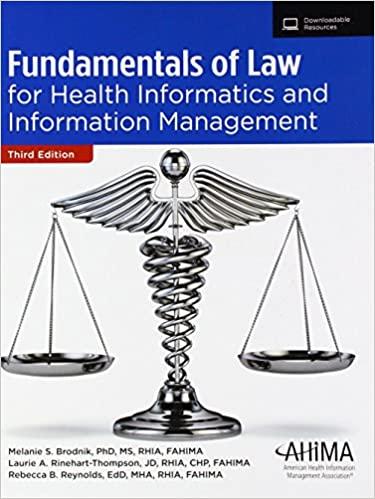Question
please share your thoughts about the following 2 statements, whether you agree or disagree with the statement why or why not, and give your own
please share your thoughts about the following 2 statements, whether you agree or disagree with the statement why or why not, and give your own opinions about it.
1. The case I have chosen regarding the evolution of privacy is New Jersey v. T.L.O. This case should have been decided differently and I particularly agreed with Justice Brennan's opinion, which concurred in part and dissented in part. Justice Marshall joined Justice Brennan's opinion. The Supreme Court ruled that the Fourth Amendment applied to public school officials, but that public school officials can operate with discretion to maintain an educational environment, which I agreed with. However, the ruling should have been decided differently because the probable cause standard was replaced with a standard of reasonable suspicion based on a test implemented to evaluate the "reasonableness" of the search. Lee and Rosenbloom explained that the Supreme Court used a test to determine the "inception" and the "scope" of the search of T.L.O's purse (p. 119). The majority opinion specified that the test resulted in replacing the probable cause standard with a reasonable suspicion standard, which led to the majority believing that school officials operated reasonably even though they clarified that the Fourth Amendment protected T.L.O's information right to privacy (US Courts).
The ruling should have been decided differently as Justice Brennan's opinion should have been the majority because it recognized that the Fourth Amendment is applicable in school settings, but that school officials can operate with discretion to search students without a warrant in certain circumstances. In addition, Justice Brennan's opinion explained that the probable cause standard should be utilized, instead of a reasonable suspicion standard, which would have resulted in school administrator's violating T.L.O's informational right to privacy and suppressing the obtained evidence. Changing the standard for school officials essentially granted school officials broad latitude to conduct searches. In his opinion, Justice Brennan wrote the majority opinion "sanctions school officials to conduct fullscale searches on a "reasonableness" standard whose only definite content is that it is notthe same test as the "probable cause" standard found in the text of the Fourth Amendment." If the court decided this case differently, it could have narrowed the scope of school administrators' ability to conduct searches of students without a warrant. In addition, if Justice Brennan's opinion or perspective was the majority viewpoint, it would have still recognized that the Fourth Amendment applies to school officials, while also granting them some discretion. A change in the decision also would have impacted the informational right to privacy of students, as it would have given students stronger protections to the right to privacy.
2. I believe the constitution is quite clear, both in the document at the time of ratification and given the 14th amendment, that the protection of free speech is of fundamental importance to the function of our democracy. The 14th amendment requires that the state not deprive anyone of life, liberty, or property without due process and also requires equal protection under the law. The Supreme Court has clarified that this includes all the first amendment rights, including free speech. A questionable decision of the court in regards to freedom of speech occurred in Connick v. Myers in which the court's standard of public concern for free speech protection for public employees is further developed. The Court had established in a number of cases that public employees' speech is protected when it is used to speak to an issue of public concern as in the case of Pickering, a public school teacher who critiqued the board of education's use of funds. His speech was protected because it was an issue of public concern how the board of education was using taxpayer money in the public school system.
In Connick v. Myers, I believe the court ruled incorrectly in their 5-4 decision that Myers' questionnaire was about internal rather than public concerns and that the underlying motive was personal and thus her speech was not protected. The assessment that the questionnaire was not of public concern is the core of the court's error. Simply as a product of the fact that the questionnaire was about the internal functions of the District Attorney's Office does not mean it isn't of public concern. It is absolutely of public concern that the District Attorney's Office is being run in an effective and efficient way. Though there was a question of whether Myers' motivation for the questionnaire had to do with a recent notification of a job transfer she didn't want, this should not change the assessment that the questionnaire's questions, even those about the office's functions are of public concern. If the office is poorly run, it is not a good use of public funds and changes in its organization and leadership should be made, just as was the case in Pickering, making Myers whole questionnaire clearly of public concern and thus it should have been found to be protected speech.
Step by Step Solution
There are 3 Steps involved in it
Step: 1

Get Instant Access to Expert-Tailored Solutions
See step-by-step solutions with expert insights and AI powered tools for academic success
Step: 2

Step: 3

Ace Your Homework with AI
Get the answers you need in no time with our AI-driven, step-by-step assistance
Get Started


